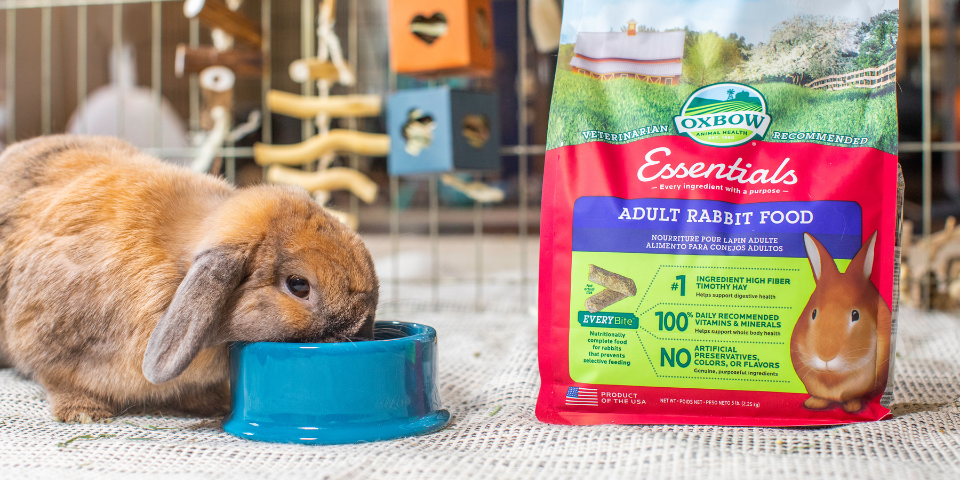Should my rabbit have more or less calcium in his diet? Am I providing too little? Too much? How do I know?
The age-old debate about the role of calcium in the diet of rabbits is an important one as we know there are potentially significant implications to calcium content contributing to bladder sludge. But, thinking about calcium only in the narrow context of its role in bladder sludge formation can lead to dangerous one-sided thinking about calcium.
The truth is that calcium is an essential component of a rabbit’s diet and, furthermore, balance of calcium with other nutrients must be taken into account when evaluating its role in the diet and health of rabbits.
Rabbits require certain levels of calcium in the diet for a multitude of important physiological processes including healthy growth of bones and dentition, as well as to maintain health once they are adults.
 Why is Calcium Important for Rabbits?
Why is Calcium Important for Rabbits?
Calcium plays an essential role in numerous processes in the body. Perhaps most notably, calcium is vital to maintaining strong, healthy teeth and bones.
A majority of calcium in the body is stored in teeth and bones where it is a key component of maintaining structural integrity. When we consider the open-rooted (constantly growing) dentition of rabbits, calcium becomes even more important to maintain dental health.
Calcium’s role in bone growth and maintenance is often highlighted for young animals but can be equally important for those older animals to avoid metabolic bone disorders like osteoporosis and provide vital bone support throughout life.
Other Roles of Calcium for Rabbits
Other less commonly talked about roles of calcium include muscle contraction and nerve signaling. Calcium is required for muscles to contract and, more specifically, to enable muscles to relax after contraction. Signaling of nerves throughout the body with the brain also requires calcium.
Calcium also plays a major role in coagulation (proper blood clotting) as well as enables the release of molecules such as enzymes and hormones. In this way, calcium is required for and impacts hundreds if not thousands of processes in the body.
 Symptoms of Calcium Deficiency in Rabbits
Symptoms of Calcium Deficiency in Rabbits
Even some of the simplest body functions and movements involve or rely on calcium. For this reason, symptoms of calcium deficiency can include:
- Weak bones and teeth
- Confusion
- Muscle spasms and cramps
- Numbness
Unfortunately, by the time symptoms of hypocalcemia (i.e. low blood calcium) are noted clinically, rabbits may have irreversible consequences.
Rabbits and guinea pigs absorb calcium differently than most other species. Whereas other animals regulate how much calcium is absorbed based on how much calcium the body needs, rabbits absorb almost all ingested calcium and excrete what is not needed through their urinary system.
Calcium deficiency may be less common in rabbits, but eliminating calcium completely from the diet is not safe. When thinking about calcium in the diet, goals should be incorporating the correct amount in the correct balance with other nutrients.
 A Proper Calcium To Phosphorus Ratio Is Important For Rabbits
A Proper Calcium To Phosphorus Ratio Is Important For Rabbits
We have discussed a lot about calcium specifically, but as alluded to above, it is just as important to consider calcium in ratio to phosphorus. Calcium and phosphorus levels in the blood are regulated by the same hormone (parathyroid hormone) which is released by the parathyroid gland when blood calcium levels get too low.
Parathyroid hormone stimulates the release of calcium and phosphorus from stores (bone) along with a reduction of calcium excretion and an increase of phosphorus excretion in the renal system. This is why a proper calcium to phosphorus ratio is so important in the diet, to not only maintain proper blood levels, but to protect bone integrity.
A ratio of 1.5-2 parts calcium to 1 part phosphorus is widely accepted as a dietary target and may be slightly higher for young, growing rabbits.
Considering all of the potential health concerns associated with high calcium, it is tempting to want to eliminate dietary calcium entirely from your rabbit’s diet. However, as we have discussed, calcium is an essential nutrient to maintain hundreds of vital processes in the body. Rabbits, like all species, will always need certain levels of calcium in their diet to maintain health.
 Consider Your Rabbit’s Individual Calcium Needs
Consider Your Rabbit’s Individual Calcium Needs
It is also important to remember that all animals are individuals, and their specific needs should also be considered. Some diseases or genetic predispositions may alter their acute and ongoing needs, so it is always important to consult with your animal’s veterinarian when developing their dietary schedule.
Monitoring how much calcium is in your animal’s dietary components is vital to ensure a proper overall diet. Commercially available foods will state calcium levels or ranges on the bag but high-calcium greens and veggies should be rotated and fed less frequently in order to balance dietary calcium concentrations.
